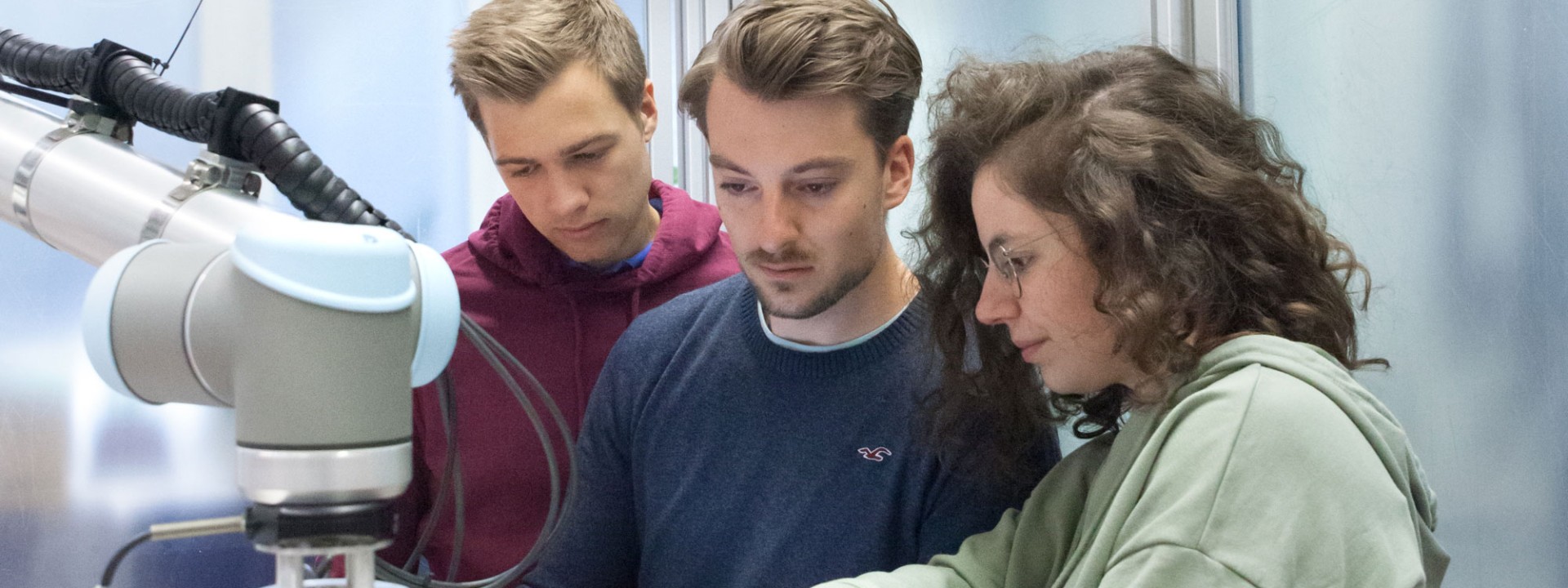Production and Automation (B.Eng.)
All products of daily life have to be produced. The demand for skilled workers for production, automation and logistics processes is high.
All products of daily life have to be produced, be it airplanes or cars, computers or cell phones, machines or household appliances.
Production engineers plan how these products are made, which production processes are used and what the factories, production lines and workplaces look like where many people are employed.You coordinate and control the processes in the factories and are responsible for ensuring that products are manufactured economically and to a high quality, while at the same time keeping employees motivated and healthy in the long term at ergonomically designed workplaces.
Automation solutions are also frequently used, for example robots that assemble products. Production engineers work with many functions in the company. Since production companies are often organized in a network of production sites - in Germany as in other countries - production engineers also work with their colleagues in other countries. "Soft skills" such as good communication skills are therefore very important.
In the study program, we prepare you for the profession. The subjects covered by the program are as varied as the job itself:
- As in all engineering degree programs, you will first learn the fundamentals of natural and engineering sciences such as mathematics and physics, technical mechanics, electrical engineering or design engineering. The focus is on the application of these fundamentals in concrete production tasks.
- In the subject Production, you will learn to select the right manufacturing processes for a specific product and to design the associated production systems (from individual manufacturing cells to production lines to entire factories). This includes the layout, i.e. the spatial arrangement, as well as organizational aspects such as material flow and logistics or the control of manufacturing.
- With regard to automation, you will learn in practical courses on real tasks to select the components of an automated cell (such as robots, sensors or grippers) and to integrate them into automated systems. This includes, among other things, the programming of the robots.
- Information technology also plays an important role in careers and studies. You will learn to use CAD systems (computer-aided design) to create 2D and 3D models of products and manufacturing equipment, to simulate loads and deformations in so-called FEM systems (finite element methods) and to use software for controlling and monitoring manufacturing processes.
- Aspects of economic efficiency touch all areas of production. Therefore, you will also acquire business management skills, for example, you will learn to apply various cost accounting methods to evaluate concepts in terms of their production costs. You will also learn to work with budgets and apply various management methods relevant to production.
- In order to develop the necessary soft skills, you will work on diverse project tasks in student teams and thus learn to represent your point of view in the group and to present results in a structured and comprehensible manner.
- The degree program also prepares you for the social and societal responsibility you have as an engineer in the field of production and automation. For example, you will learn to develop products and production systems with resource conservation and recycling in mind, and to take social and human aspects into account when planning and operating production systems.
- In the area of linguistic and intercultural skills, you will learn to understand technical and scientific texts in English and to write them yourself. In joint projects with students from our international degree program "Production and Automation", you will also gain experience in working in teams with an international composition.
A detailed description of the program's learning outcomes can be downloaded here.
Requirements for the study at the Munich University of Applied Sciences are:
Advanced technical college certificate or the general or specific higher education entrance qualification (preferably with a concentration in the natural sciences or technical fields of study). You can find more detailed information on this at: www.hm.edu/bewerberinfo
These further personality characteristics are important:
- Interest in questions relevant to the natural sciences and technology
- Willingness to work in interdisciplinary fields
- Comprehension of complex relationships
- Curiosity about the unknown, the new, the untried
- Flexibility
The program consists of 6 theoretical semesters and one practical semester (Internship). It ends with a four-month bachelor's thesis, which is usually written in a company and often represents the first contact for a later employment relationship.
The demand for engineers with the profile of this degree program is high. Graduates work successfully worldwide in production companies in all industries, from aerospace and automotive to mechanical engineering or the cosmetics industry. They are sought-after and sought-after specialists.
- Production engineering (planing factories, planing and development of production and assembly systems)
- Process engineering (Production process planing, material flow, logistics planning, ...)
- Production control (Bid planning and control, Supply-Chain-Management, ...)
- Quality control of the production process
Career Opportunities for Graduates:
- Management of specific areas / processes in production / logistics
- Oversight of the entire production and or logistic
- Independent contractor as engineer or expert consultant
